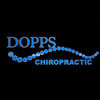Upper Cervical Chiropractic Care for ADHD Relief in Overland Park with Dr. Rory Dopps
- Dr. Rory Dopps

- Nov 7, 2024
- 4 min read

Introduction
ADHD is a condition that affects focus, impulse control, and overall cognitive function, making daily tasks and concentration challenging for those affected. Many people don’t realize that misalignments in the upper cervical spine, known as subluxations, can contribute to symptoms by disrupting the balance of the nervous system. Dr. Rory Dopps in Overland Park specializes in upper cervical chiropractic adjustments aimed at relieving subluxations and supporting nervous system balance, which can help manage ADHD symptoms naturally. This guide will explore the relationship between chiropractic care and ADHD, the role of the nervous system in ADHD, and a complementary nutritional protocol designed to optimize cognitive and nervous system function.
1. Understanding the Nervous System: Sympathetic vs. Parasympathetic in ADHD
Sympathetic Nervous System (T1 to L2): This system controls the body’s "fight or flight" response, increasing heart rate and blood pressure while reducing relaxation and focus. Overactivity in the sympathetic system has been linked to symptoms such as restlessness, impulsivity, and high stress, which can exacerbate ADHD symptoms.
Parasympathetic Nervous System (Cranial and Sacral Nerves): In contrast, the parasympathetic system promotes "rest and digest" functions, supporting calm, focus, and concentration. For individuals with ADHD, proper parasympathetic function can be essential for managing attention and reducing impulsivity.
2. The Role of Upper Cervical Subluxations in ADHD Symptoms
How Subluxations Affect ADHD: Misalignments in the upper cervical spine can interfere with the brainstem and nearby nerves, stimulating the sympathetic nervous system and reducing parasympathetic activity. This disruption may keep the body in a heightened "fight or flight" state, which can increase hyperactivity, distractibility, and impulsivity.
Consequences of Sympathetic Overactivity: Chronic sympathetic activation has been associated with symptoms commonly seen in ADHD, such as difficulty concentrating, sleep disturbances, and heightened stress responses.
3. How Upper Cervical Adjustments May Help Manage ADHD Symptoms
Targeted Adjustments for Subluxation Relief: Dr. Rory Dopps uses gentle upper cervical adjustments to realign the spine, relieve brainstem pressure, and reduce overactivity in the sympathetic nervous system.
Impact on the Parasympathetic System: By restoring spinal alignment, these adjustments allow the parasympathetic nervous system to function optimally, supporting a calmer mental state, enhanced focus, and improved self-regulation.
Personalized Approach for ADHD Support: Dr. Dopps tailors each chiropractic session to meet the unique spinal structure and nervous system needs of patients, aiming to reduce ADHD-related symptoms by supporting nervous system balance.
4. Nutritional Support Protocol for ADHD and Nervous System Health
In addition to chiropractic adjustments, Dr. Dopps recommends a nutritional protocol specifically designed to support nervous system health and cognitive function. This protocol includes supplements that aid in managing stress, enhancing focus, and balancing neurotransmitter levels, which are essential for ADHD management.
Phosphatidylserine (PS 150): Phosphatidylserine supports brain cell membrane health and helps modulate stress hormones, reducing the impact of chronic stress and enhancing focus for those with ADHD.
NeuroMag™: This magnesium L-threonate supplement crosses the blood-brain barrier, helping to reduce neural excitability and promoting relaxation. Magnesium also supports parasympathetic function, alleviating hyperactivity and supporting restful sleep.
OmegAvail™ Ultra DHA: This high-DHA omega-3 supplement supports brain health, reduces inflammation, and improves communication between nerve cells, which is essential for focus and calm, aiding those with ADHD symptoms.
Neurolink™: Neurolink™ is formulated with neurotransmitter precursors to support dopamine, serotonin, and GABA production, helping balance mood, reduce impulsivity, and support relaxation.
These supplements are available at Dopps Chiropractic and provide nutritional support alongside chiropractic care, offering a natural and integrative approach to managing ADHD symptoms.
5. The Importance of DUTCH Testing for Comprehensive ADHD Support
Identifying Hormone Imbalances: DUTCH (Dried Urine Test for Comprehensive Hormones) testing is recommended by Dr. Dopps to identify any hormone imbalances that could contribute to ADHD symptoms. Elevated cortisol levels, for instance, can exacerbate “fight or flight” responses and impact focus.
Assessing Nutritional Deficiencies: DUTCH testing also identifies deficiencies in key nutrients like vitamin D and B vitamins, which are essential for balanced neurotransmitter function and focus. Addressing these deficiencies can enhance the benefits of chiropractic adjustments and improve the effectiveness of the nutritional protocol.
6. Chiropractic Care for Common Symptoms of ADHD
Concentration and Focus Issues: Chronic sympathetic activation can make it difficult to concentrate and stay calm. Relieving subluxations allows the parasympathetic system to support better focus and sustained attention.
Hyperactivity and Restlessness: Many patients with ADHD experience hyperactivity and impulsivity, which are linked to sympathetic overactivity. Chiropractic adjustments may help reduce these symptoms, supporting a calmer, more focused state.
Sleep Disturbances and Anxiety: Insomnia and anxiety are common co-occurring symptoms in ADHD. By addressing nervous system imbalance, chiropractic adjustments promote relaxation and improve sleep, supporting ADHD management.
7. Expected Outcomes and Long-Term Benefits for ADHD Management
Reduced Hyperactivity and Improved Calm: By addressing upper cervical subluxations, patients may experience relief from hyperactivity, impulsivity, and anxiety, resulting in improved focus and calm.
Enhanced Cognitive Function and Focus: With a balanced nervous system, patients may experience better mental clarity, focus, and attention, essential for managing ADHD symptoms effectively.
Sustained Digestive Health: Proper alignment and reduced stress help support the parasympathetic system, enhancing digestive function. This can be particularly beneficial for children and adults with ADHD, as gut health is often linked to mood and cognitive function.
Conclusion
At Dopps Chiropractic in Overland Park, upper cervical adjustments provide a natural approach to supporting ADHD management by restoring balance to the nervous system. By addressing spinal subluxations that can trigger sympathetic overactivity, Dr. Rory Dopps helps patients achieve a state of improved focus, calm, and overall well-being. When combined with a specialized nutritional protocol and insights from DUTCH testing, patients receive a comprehensive approach to ADHD support. To experience the benefits of balanced nervous system function, schedule a consultation with Dopps Chiropractic Overland Park.




Comments